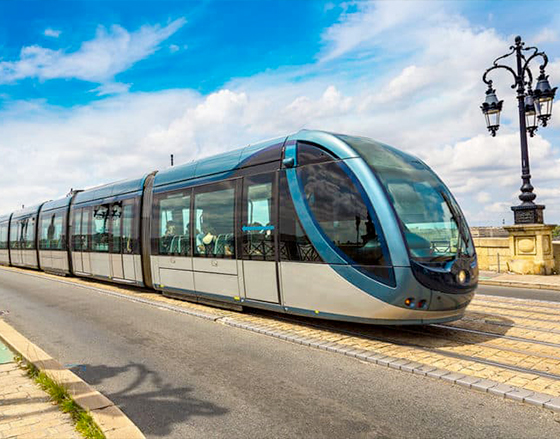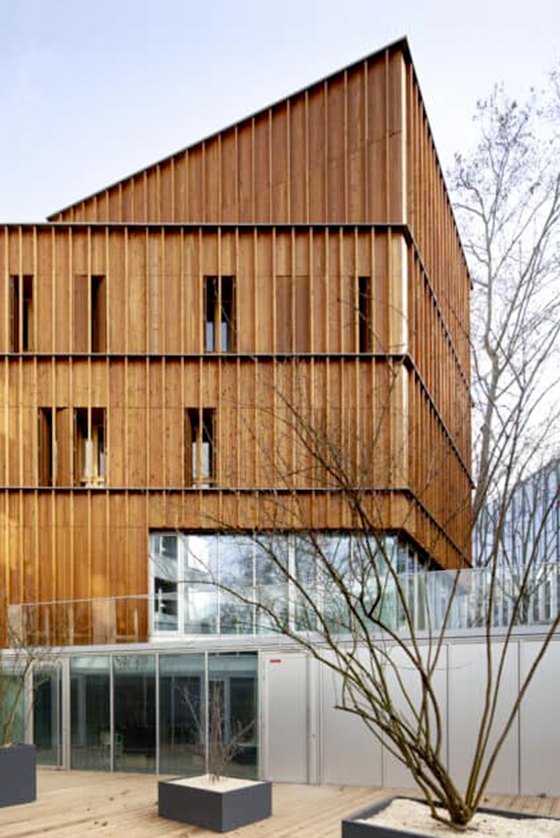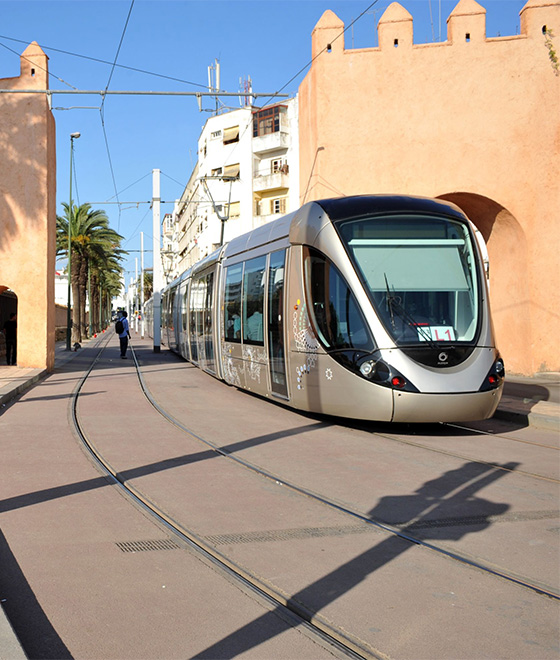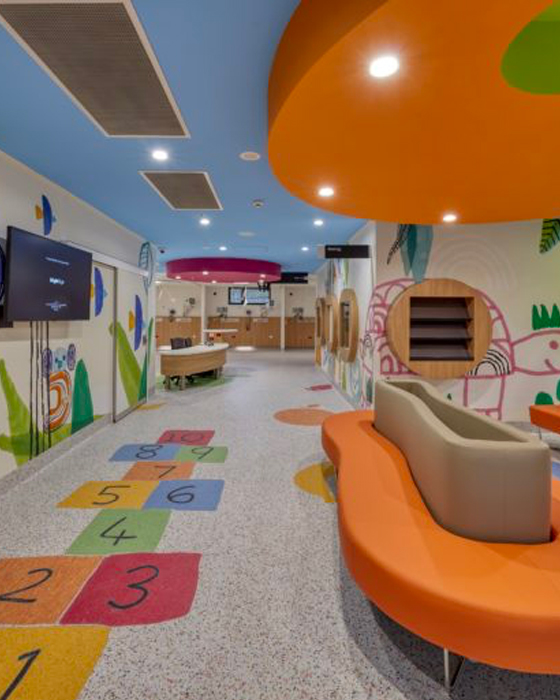
The Bouygues group prioritises meeting the needs and expectations of its customers.
To this end, the business segments develop innovative products and services that create value. Accordingly, Bouygues is committed to offering solutions that address the climate emergency, resource scarcity and rapidly retreating biodiversity. Bouygues supports its customers worldwide to reduce their carbon footprint.
The Group focuses particularly on…
…encouraging electric mobility

Transportation is a very important part of the Group’s climate strategy because it is the main source of CO2 emissions in the world. Bouygues is therefore innovating and working hard to provide public transport and soft mobility infrastructure (tram lines, cycle paths).
For example, Colas offers Wattway panels. When these are placed on cycle paths, they generate renewable energy as bikes pass over them, which can then be fed in to the power grid.
The Group is also investing in electric mobility. The expansion of the charge point network is fundamental to encouraging the use of electric vehicles and therefore ultimately to stop using fossil fuels. The network of charge points installed by Bouygues Energies & Services avoids nearly 660 tonnes of CO2 each month. Their use is greatly facilitated by mobile apps and web sites which help geolocate them.
Bouygues also addresses these issues very early on by integrating charging solutions into the design of buildings. In 2019, the “Ready4Mobility” consortium brought together players from the construction and mobility sectors in order to draft a common set of guidelines to promote building/mobility convergence.
…safeguarding resources
The Bouygues group has committed each one of its business segments to redesign its processes, products and services to factor in circular economy principles in order to safeguard natural resources.
Construction businesses:
Pagiven that the construction industry generates 70% of all waste produced in France, the Bouygues group is rolling out solutions in four priority areas:
1- the selection of sustainable and recyclable materials from the project’s design stage
2- a reduction in the volume of resources used during the construction stage
3- on-site recovery and repurposing
4- recycling of materials
Telecoms:
Several million handsets are lying around unused in France. In reaction to this, Bouygues Telecom is running awareness campaigns to encourage people to hand them in for recycling as part of its 4R strategy (repair, recover, refurbish, recycle). As a result of this initiative, some 228,494 unwanted smartphones were recycled in 2020.
97%
of French people say they would like smartphones to have a longer lifespan. Bouygues Telecom’s “Sustainable smartphone solutions” programme is designed with this very aim in mind.
Media:
TF1’s set designers apply eco-design principles and recycle existing set components.

All the Group’s products and services are designed to make everyday life easier and more enjoyable for its customers, whether in their homes, neighbourhoods, towns or cities, communicating, reading the news or watching entertainment.
In particular, Bouygues pledges to…
…deliver a high-quality experience for customers in their homes or offices

Climate change, energy transition, the boom in digital technology and teleworking are constantly reshaping the expectations of our customers in relation to where they live and work. To meet these expectations, Bouygues is gearing its products and services towards access rather ownership in response to societal changes. This means:
- Connected homes: where occupants can monitor energy consumption in real time and control lighting, heating and roller shutters remotely. Connected objects and digital voice assistants are completely transforming our homes, making them more practical and energy-efficient.
- Co-living: launched in France in 2020 by Linkcity, Bouygues Construction’s property development subsidiary, the Build to Rent (BTR) concept offers ready-to-rent properties with integrated services. These properties come with shared facilities (reading or TV room, roof terrace, fitness room, etc.) and have already proved successful in the UK with family and urban tenants. The co-living concept, with private and shared spaces as well as flexible leases, is more suitable to young professionals.
- Co-working spaces and offices: coworking spaces are designed as pleasant places to be, encouraging collaboration and well-being at work and are suited to the new ways of working.
…facilitate mobility in both urban and rural areas
Bouygues’ construction businesses, by building bridges, roads, tunnels and railway tracks, ease the flow of people and goods. This infrastructure meets the increasing needs for mobility driven by population growth and urbanisation. They help drive economic growth throughout countries.
For a number of years, the Group has focused on renovating and rehabilitating existing structures in order to limit land take and CO2 emissions. Around 90% of sales generated by the worksites of Colas, the world leader in road construction, is generated by projects based on brownfield sites.
Colas also provides services for users that make roads safer and keep traffic flowing freely.
Finally, in its drive to encourage low-carbon mobility, the Group works with towns and cities to expand soft mobility networks such as cycle paths, tram lines and urban cable car systems.
90%
(around) of sales generated by the worksites of Colas, the world leader in road construction, is generated by projects based on brownfield sites.

…make it easier to access communication networks and media content

Teleworking, home-schooling and virtual meetings with friends and colleagues…the Covid pandemic has accelerated the emergence of new practices that require high-performance communication networks. Bouygues is investing to provide the fastest fixed and mobile speeds and access to services throughout the country, even in the most rural areas. For example, the Group has satisfied all its targets within the New Deal agreement signed with the French government that aims to ensure coverage of rural areas with 4G.
The media businesses are rethinking their products and services to cater to growing demand for personalised content, namely with catch-up TV, enhanced services and video-on-demand.
By replacing its TV box device with an app embedded in a Smart TV, Bouygues Telecom is opening up a new era in triple-play offers. These simplify the user experience, provide access to a wider range of content and reduce the carbon footprint, for the same level of usage.
100%
All the objectives of the New Deal, an agreement signed with the French government to ensure 4G coverage in rural areas, have been fulfilled
…offering solutions to the healthcare sector
NewCare In 2021, Bouygues Construction unveiled its NewCare offer dedicated to healthcare facilities. This new approach, which was jointly developed with numerous healthcare partners, is designed to support the development of sustainable and resilient healthcare areas and spaces that promote the well-being of residents, patients and their friends and family. NewCare also provides an optimised and efficient working environment for carers and staff (see photo). The Group also provides technical services to healthcare facilities in Canada through its subsidiary Plan Group (belonging to the Energies & Services arm), which has upgraded the electrical, mechanical and technology systems at a number of hospitals. One example is the Humber River Hospital in Toronto – known as a “digital hospital” for its pioneering use of robotic technologies (see also opposite) – where Plan Group worked alongside the facility’s teams and carried out work for the benefit of patients and staff.
52
minutes per day on average saved for staff working at the Humber River Hospital following the digitisation of processes carried out by Bouygues Energies & Services in Canada. Thanks to this, they are able to focus on delivering medical care to patients.
